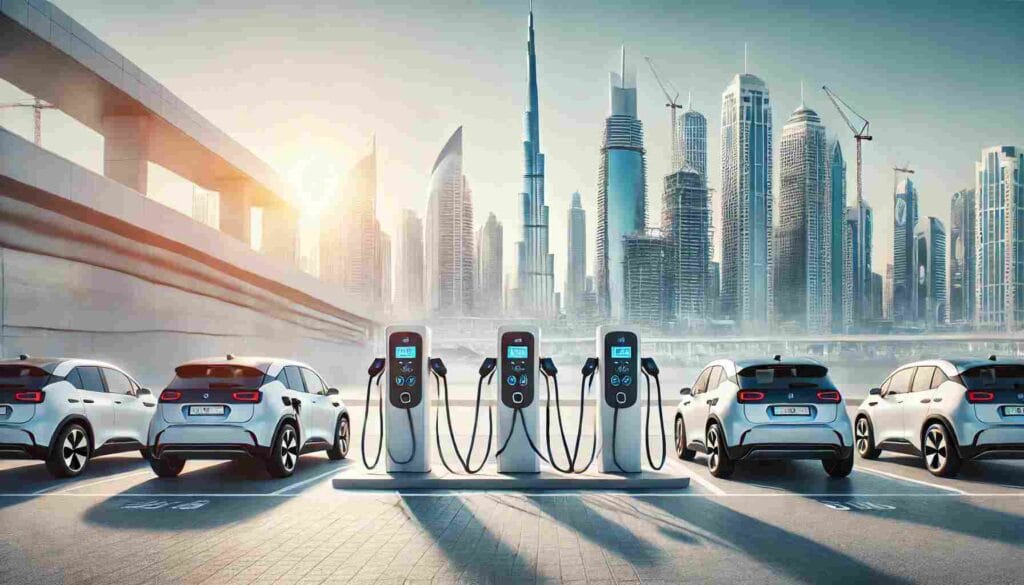No products in the cart.
The UAE is quickly becoming a leader in electric vehicle (EV) adoption in the Middle East, aligning with its vision for sustainability and a cleaner future. As the nation sets ambitious targets for reducing carbon emissions and fostering renewable energy, the EV industry is experiencing unprecedented growth. This blog post will explore the drivers behind the UAE’s EV push, current infrastructure developments, government incentives, and the future outlook for this exciting industry.
Why the UAE is Embracing Electric Vehicles
The UAE’s move towards EVs is largely driven by its commitment to reducing greenhouse gas emissions. As part of its Vision 2021 and Energy Strategy 2050, the UAE aims to increase clean energy usage to 50% of the total energy mix by 2050. Electric vehicles, as a crucial component of clean transportation, are seen as a vital means to achieve this goal.
With initiatives like the Dubai Clean Energy Strategy and Abu Dhabi’s Green Mobility policies, EVs are being promoted across the emirates. These policies encourage both individual ownership of EVs and commercial adoption in public transportation, logistics, and ride-sharing services.
As opposed to Super Mario Bros. Wonder, each of the characters in Sonic Superstars plays differently. For example, Amy double
jump and has a hammer she can use to smash enemies. On the other hand, Knuckles can glide across the screen and climb walls.
Additionally, each character has different powers that are granted by the Chaos Emeralds.
My second most anticipat game this holiday, just slightly behind Super Mario Bros. Wonder, is Sonic Superstars. Next to Mario,
I’m a big Sonic fan and love Sonic 2D games the most. Sonic Superstars is a brand new 2D Sonics game with 3D characters with
bright and colourful graphics. The game supports up to 4 players in local multiplayer fun and includes your favourite characters
such as Sonic, Tails, Knuckles Amy and more.

Infrastructure Development for EVs in the UAE
To support the rise of electric vehicles, the UAE has invested heavily in building a robust charging network. Government entities such as the Dubai Electricity and Water Authority (DEWA) have set up hundreds of EV charging stations across the emirates, making EVs a practical choice for daily commuting and long-distance travel.
Beyond just numbers, the UAE is also investing in fast-charging technology to reduce charging times and make EVs more convenient for drivers. Charging stations are now widely available in parking lots, malls, residential complexes, and even along major highways, facilitating EV usage and accessibility.
Government Incentives Fueling EV Adoption
The UAE government has introduced numerous incentives to make EV ownership more appealing to residents. These benefits include free parking for EVs, exemption from registration fees, and access to designated “green” lanes. In Dubai, EV owners even benefit from free charging at DEWA stations, making EVs not only a sustainable choice but also a financially savvy one.
The UAE has also launched several programs to encourage private and commercial fleets to transition to electric. Companies across the logistics, transport, and ride-hailing sectors are investing in EVs to reduce operational costs and align with environmental regulations.
The Future of Electric Vehicles in the UAE
With the steady growth in infrastructure, supportive government policies, and increased consumer awareness, the UAE’s EV market is set to expand further. Industry experts predict that electric vehicles could comprise a significant portion of the country’s fleet by the next decade. The government’s commitment to a sustainable future and the increasing range of EV models available from leading car manufacturers will likely make the UAE a model for EV adoption in the region.
In addition, the UAE’s interest in cutting-edge technologies, such as autonomous electric vehicles and smart grid systems, points toward a future where EVs are seamlessly integrated into the nation’s transportation ecosystem.
Conclusion
The UAE’s dedication to clean energy and sustainable transportation is paving the way for rapid growth in the electric vehicle industry. As infrastructure, incentives, and consumer interest continue to align, the future of EVs in the UAE looks promising. With its blend of ambition and innovation, the UAE is setting a high standard for EV adoption in the Middle East, making it a regional leader in the drive toward a greener future.








Add comment